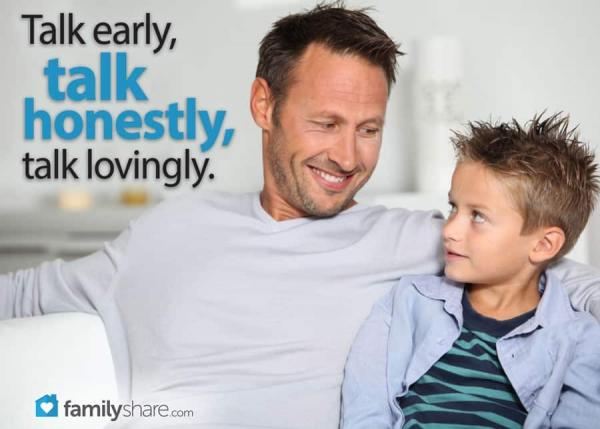
"How did you tell your kids they were adopted?"� As the mother of three children, two who joined our family through adoption, I get asked this question a lot. For me, the answer is simple:
-
Talk early
-
Talk honestly
-
Talk lovingly
First: Talk early
We adopted our children as newborns. They are now 10 and 7 years old, and they have always known that they joined our family through adoption. There is not a moment in their life when they suddenly learned of their adoption. It is a part of their story right from the beginning. We did this in several ways.
We were fortunate to have pictures of our children's birth moms. We looked at these pictures and talked about their birth moms with them before they could even talk. As they grew and could understand a little more, I would tell each one of them that they grew in their birth mom's tummy and that she loved them so much she carefully picked just the right family for them. Even if yours is a situation where the birth mom's rights were not voluntarily relinquished, or you do not have photos of the birth parents, you can still talk about the selfless act their birth mom made in giving them life, and how happy you are that they are now - fully and completely - a part of your family.
We would also read books to our children about adoption (our favorite is Tell Me Again About the Night I Was Born by Jamie Lee Curtis), and we told them their own story of how they came to be a part of our family. When my daughter was three and four, her very favorite bed time story was "her story"� about how she joined our family.
If your child is an infant or toddler, start TODAY talking with him or her about the loving choices that brought your child to your family. If your child is older, still talk with him or her about it TODAY and be prepared to speak especially honestly and lovingly.
Second: Talk honestly
. As with all important discussions, it is vital to speak honestly with your child about the way he or she joined your family. With young children it is important to use age-appropriate facts and words they can understand. Do not feel the need to overload them with every bit of information you have about their birth parent(s), but always maintain an open, honest communication and show your child that she can always come to you with concerns by calmly and honestly answering any questions he or she has.
If your child is older, he or she may wonder why you waited so long to tell the story. Although it may be difficult, be honest with yourself and your child about the answer. Were you afraid or unsure about what to say? Were you dealing with feelings of insecurity related to infertility and just couldn't talk about it? Whatever the reason, be prepared to give it if your child asks, and be sure to follow up with a reassurance of how happy you are to have him as your child.
Additionally, it is important to allow your child to honestly experience any emotions they have concerning this news. Remember that you are the parent, and although it may be difficult to remain calm if your child is expressing anger or resentment toward you, doing so is a key in working through the situation. Acknowledge their anger or frustration or sadness, and help them navigate through it in an honest and loving way. Use words like "I can see that you're upset, let's talk about this."� Or perhaps, "I can see that you are angry right now. Would you like some time to cool off and we can talk about it later?"� And then be sure to follow through with your promise to communicate later when emotions are more settled.
Third: Talk lovingly
Hanging on my living room wall, in the middle of an assortment of family pictures, is a framed quote which says, "A family is a little world created by love."� We talk regularly about the importance of our family and how it is love that connects families together and not necessarily blood.
Think about it. A husband and wife are not related 'by blood', but that is one of the strongest human bonds there is. A family is not just a group of people who share the same genes; a family is a group of people who work together, who play together and who choose to continue loving and caring for each other even when life gets difficult.
Also, speak and act lovingly towards your child's birth parent(s). Even if you do not have any personal interaction with your child's birth mom, or if it's a difficult situation, speak about her in a loving way. If for no other reason, you should love the parent's choice to give life to your child. Knowing that you love the birth mom, and allowing your child the freedom to love her in her own way, builds a strong foundation for your child's identity. Remember, you are the parent. You will always be the parent, but children can never have too many people who love them.
In an open adoption, it is also important to lovingly set appropriate boundaries. These will be different in every situation and honest communication with birth parents is essential.
When talking about adoption with your child remember: Talk early, talk honestly, talk lovingly. If you make adoption a normal part of life, then it will be just that for your child: a normal part of life.
If you need further assistance, please seek out an adoption professional in your area or check out www.adoptioncouncil.org or www.itsaboutlove.org for links to adoption resources.

